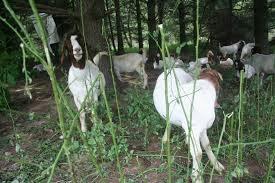 Legislation to raise the minimum wage and to provide benefits in California has resulted in a series of unintended consequences including closing of QSRs by franchisees and abandoning production of leafy greens. A completely unpredictable problem has arisen relating to the deployment of goats to control vegetation on hillsides in the vicinity of homes and businesses. Companies such as Western Grazers, operate herds of goats that effectively remove vegetation as they consume weeds and shrubs. This is especially necessary after recent heavy rains. In winter, this vegetation would otherwise dry out and become tinder for local fires. State labor regulations have increased the cost of herders most of whom are H-2B workers from Peru. Their monthly salary has increased from approximately $4,000 to $14,000 since regulations require an hourly rate and overtime in place of a flat monthly salary.
Legislation to raise the minimum wage and to provide benefits in California has resulted in a series of unintended consequences including closing of QSRs by franchisees and abandoning production of leafy greens. A completely unpredictable problem has arisen relating to the deployment of goats to control vegetation on hillsides in the vicinity of homes and businesses. Companies such as Western Grazers, operate herds of goats that effectively remove vegetation as they consume weeds and shrubs. This is especially necessary after recent heavy rains. In winter, this vegetation would otherwise dry out and become tinder for local fires. State labor regulations have increased the cost of herders most of whom are H-2B workers from Peru. Their monthly salary has increased from approximately $4,000 to $14,000 since regulations require an hourly rate and overtime in place of a flat monthly salary.
Companies supplying foraging services using goats are unable to pass the wage increases on to customers. The net result will be an accumulation of foliage and potentially destructive fires later in the year. Even without seasonal fire events, insurance rates will be affected by a failure to take preventive measures. The alternative to goats will be the need to spray herbicides that will increase environmental pollution and potentially impact water quality and health.

What appeared to be a straightforward and potentially beneficial measure in the confines of a legislative chamber clearly has produced manifold unintended consequences when applied in practice. The market place should be the determinant of rates. The situation of foraging goats and their herders is a prime example of why governments should not intervene in free-enterprise. This was a lose-lose situation for the H-2B workers from Peru, homeowners, municipalities footing the bill for fire events and even the goats. There is a lesson here but it will not be heeded by politicians advocating social engineering and the rise of the nanny-state.